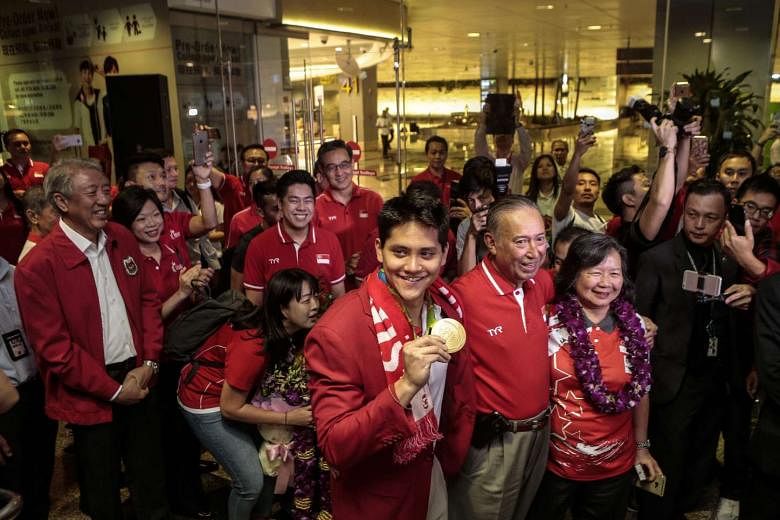The first rule about drawing in readers that was drummed into me when I started out as a barefoot reporter a (very) long time ago was that all news is local. It was local because our readers were, my first editor said.
While he meant it in the geographical sense (he ran the local news desk), I realised that readers defined the rule by personal relevance, not physical proximity. (Quick example: American man bites dog in New York - interesting. Singaporean bites dog in New York - very interesting. Famous Singaporean bites dog in New York. Wow... and why else was he there, and with whom?)
So, despite the 16,000km distance, the Rio Olympics will be cherished as the first locally relevant one when the curtain comes down tomorrow, Rio time (Monday, Singapore time).
The Games has become personal because of a singularly elevating feat by a 21-year-old Singaporean swimmer: Joseph Schooling's 100m butterfly swoosh in 50.39 seconds that wrested the gold medal from his American idol Michael Phelps, a South African and a Hungarian, all of whom finished dead second. Shock turned into awe when we realised that he had captured his great and gracious hero's Olympic record as well.
Letters celebrating Schooling's win and ruminating on its implications have been running for five straight days in the Forum pages of this newspaper at press time; a rare frequency, and rarer still because the topic is a glorious and happy one.
Schooling's swim has amplified local interest in the Olympics from an obsession confined to sports nuts like me every leap year, to a raft of readers' conversations on national talking points. Readers' bouquets went one way - to the Schoolings, and brickbats and soul-searching mainly to the other - officialdom's inadequate management of precious native athletic talent. In the process, race, national identity, core values, talent eco-systems, official policies and priorities bounced back and forth, and often shrilly in the cavernous platforms of social media.

The relief must have been palpable at Mediacorp, the official Olympic broadcaster, for dodging a public bullet at the last minute by replacing its plan to air delayed telecasts with live broadcasts. But Mediacorp redeemed itself, thanks in large part to a single brilliant summary by its anchor in Rio, Mark Richmond. Telecasting on site, Richmond's flawlessly poignant editorial freeze-framed Schooling's feat, reassuring the nation that the astonishment and euphoric afterglow that was still reverberating in the living rooms of Singaporean homes were real.
The key theme of readers' pique centred on the disparity between the self-reliant courage and stamina of Colin and May Schooling, who expended their time and treasure to advance the dream of their only child, and official support in effort and money of a 23-year-old policy to groom foreign sports talent and convert them into Olympic-winning Singaporean athletes. The dissonance has sharpened because the Schoolings achieved what the policy did not.
Schooling's achievement made this theme personal for readers because his Olympic story was, at the heart of it, familiarly local. It was about family, community and citizenship. His backstory telegraphed the perception of the Schoolings as living proof of the perfect Singapore family - one that succeeded because they measured self-worth and achievement by character and not wealth; by the sense of one's propriety and not the size of one's property.
Each of their stories articulated what Singaporeans value (duty, diligence, honesty, teamwork, loyalty, trust and love) and how life should be lived (purposefully, peaceably, positively and modestly).
Readers took to Mr Schooling because he never lost sight of a father's duty, which is to prioritise character above all else. So, readers who are fathers, remember well Mr Schooling's overriding concern when he turned over the charge of his 14-year-old boy to the American coach, Spaniard Sergio Lopez, in Florida: Nurture his son into a gentleman before priming him as a champion.
Singapore mothers can identify with Mrs Schooling's ceaseless devotion to her child while working and running the household, from the pre-dawn wake-ups to canvassing the Government to defer Schooling's national service, not to mention the separation from her soulmate for months on end. Her transcontinental odyssey is a story many Singapore mums replicate locally for their children, while holding a job and making the house a home. Couples appreciate what seems apparent in Mr and Mrs Schooling's marriage: the tensile, tender bond forged by a long partnership which has enabled them to unite behind the common cause of their child.
And then there's Schooling, their Olympic prodigy, who not only swam like a champion but connected afterwards like a personal friend to his generation, an approachable elder sibling to younger ones and like a filial son who understands the enormity of parental sacrifice.
Finally, it is the way he connected like a Singaporean that has endeared him to us: His native sense of citizenship, from a grungy love for grease-black chye tow kueh (fried carrot cake) and Milo dinosaur, to his neighbourly generosity in sharing his extraordinary accomplishment with citizens regardless of race, age or station.
So it was inevitable that the Schooling story has accentuated readers' criticism of the longstanding government policy of recruiting foreign athletes. It did not help that the most reliable Olympians in this talent pool, the women table-tennis players, came up empty for the first time since they broke the nation's 48-year medal drought by winning a silver in the team event at the 2008 Olympics in Beijing.
But, interestingly, the Schooling story has also prompted a positive and refreshing narrative arising, perhaps, from greater public understanding of the arduous journey towards athletic excellence; one where repeated failures are a given and success, elusive and rare.
The serious and passionate online conversations about foreign talent has shifted appreciably from criticism - and denigration - of foreign talent citizens, to calls to examine the faultlines of policy and thinking by policymakers.
Singaporeans are not unwelcoming to foreign talent citizens, or it would be hard to explain the abiding fondness of football fans for Alexander Duric, the first Slavic national captain whom we count as one of our own now. Duric is loved as much because his naturalisation was, well, natural, rather than contrived. He came here to ply his football as a foreigner, and then assimilated himself and his family seriously and joyously before applying for citizenship.
Mrs Schooling is Malaysian but hardly any Singaporean has held this against the family even before her son's Olympic glory. In fact, the trolls and xenophobes who tried a few years ago targeted his Caucasian surname instead. They promptly retreated after The Straits Times videotaped and aired Mr Schooling's sharp, good-natured rejoinder in Malay and Teochew. And the rare dissenting original poster (OP) who resurfaced the allegation 13 minutes after Schooling's Olympic win last Saturday was so resoundingly blackballed, even the trolls would have pitied that oddball of an OP.
Collectively, Rio suggests that Singaporean athletes may have outraced their support systems in desire and commitment to high performance.
Swimmer Quah Zheng Wen's extraordinary semi-final achievement suggests a lack of official foresight in nurturing an incredible talent to his fullest potential. The virtually do-it-yourself routes to Rio by sculler Aisyah Saiyidah and sailors Justin Liu and Denise Lim raise worries of official napping or, worse, neglect.
Institutional development for sporting excellence has been fitful, and the arc of sports leadership in Singapore seems to be arrowing downwards from the active enthusiasm of the 1990s, which gave rise to centres of excellence and the establishment of a sports ministry.
Sure, lofty targets, while seemingly - and still as - fantastical (qualifying for the soccer World Cup in 2010), and contentious programmes (the Foreign Talent Scheme) were part of the mix.
But what was unmistakably uplifting was the fraternity's passion - the oxygen of sports - to achieve excellence which permeated all the stakeholders, from parents and athletes to sports officials and civil servants.
One would have to trawl back to the first golden age of local sports - the early years of independence and the decade after World War II to recall such heady times... when world champion Malayan shuttlers representing pre-independent Malaysia and Singapore, and Singapore's first Olympic medallist, silver-winning lifter Tan Howe Liang (Rome, 1960), shocked and gratified the pioneer generation, the way Schooling's Olympic feat has now.
Today, sports is no longer a ministerial-level priority and the centres of excellence are gone.
Hopefully, these will return soon.
Perhaps the first change policymakers and the public should make is to drop the binary notion of sports. The win-and-we're-with- you-but-lose-and-you're-on-your-own mindset must go.
The Schoolings have shown that the unpredictability of Olympic success can only be tackled effectively from the start by consistent support and undivided focus on expecting and solving failures, and unyielding, systematic progression.
The world is likely to remember the Rio Olympiad for validating Jamaica's Usain Bolt as the greatest sprinter of all time, Japan's Kohei Uchimura as the greatest gymnast, and America's Phelps as the greatest swimmer.
But, thanks to the Schooling effect, we will remember it foremost as Singapore's greatest Olympics. Expect every Olympiad from now on to be savoured with the flavour of a local news event.
If readers have their way, the next step is for the Government and iconic Singapore companies to reward the Schoolings with a permanence that matches the significance of Joseph's shattering feat.
The million-dollar prize money promised by the Government is useful, but seems inadequate, even on the lesser level of reimbursement. A meaningful pension is a fairer reward because Schooling's achievement is at least worth the work of a lifetime of an elite professional or civil servant.
And readers who criticised the hasty, million-mile Krisflyer handout by Singapore Airlines for its door-gift tackiness have a point.
SIA could consider this instead for a start: free and unqualified first-class travel for the Schoolings for as long as he swims for Singapore, and free business-class seats thereafter.
All told, the Schoolings deserve far more, but no less, surely.
Responses
AGNES SNG
Thank you for your spot-on article. It articulated all the opinions, feelings and frustrations of many of us over the whole Schooling story and policies of officialdom. So, it was with great appreciation that I read your article and sincerely hope that the powers-that-be, jumpers onto the bandwagon and other free loaders read the article too and spend some time reflecting on the points made. Thanks; it was a great read and I am keeping it in my file to be re-read.
STEVEN TAN
Well written and good thoughts, especially on the final few paragraphs. I think he should be given free government scholarships for his Uni education too!
JIM LEE
Read your article today. I think we spend too much monies and resources on football which does not have any serious potential. If these resources from government and private sources can be chanelled into serious sports, we will have better future in other sports.


